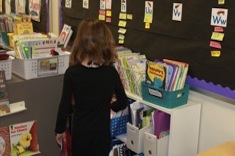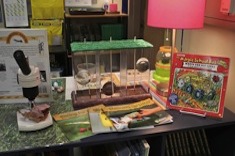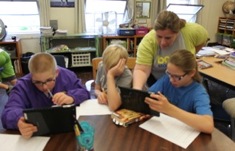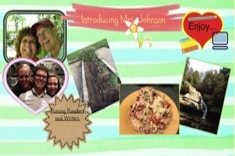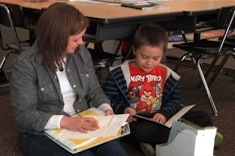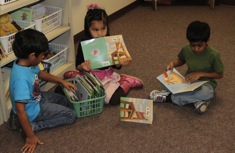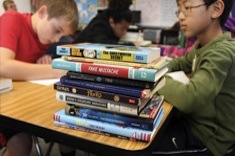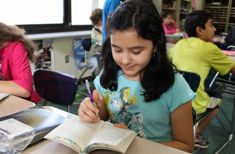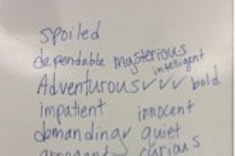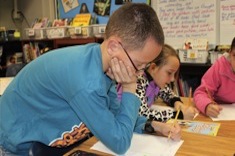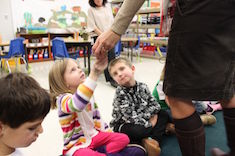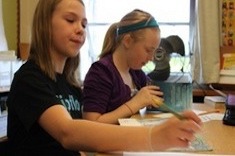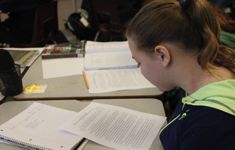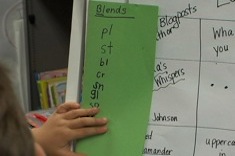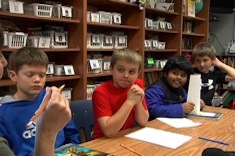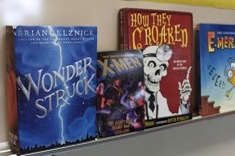Teaching Reading
Our contributors lead reading workshops in classrooms with creative flair. Over the past 12 years, we've filled our site with loads of suggestions, tools, and tips for using engaging books throughout the curriculum to hook kids on reading. Here is where you will find many stories of successful and not-so-successful workshop days, and what we learned from them. We bring these stories to life through hundreds of video examples.
Latest Content
Questions and Picture Books
Katie DiCesare suggests some mentor texts for fostering curiosity in young readers.
Picture Books or Beginning Readers?
Many beloved characters from picture books are showing up in beginning readers, and in the process can lose a lot of their appeal. Shari Frost provides teachers with criteria for choosing between picture books or beginning readers.
How to Get a Book to Catch Fire
If your goal is to get teens more excited about independent reading, Gretchen Schroeder has suggestions to help.
Explore: Time for Nonfiction
Andrea Smith uses Explore Time with her fourth graders to build interest in nonfiction.
Twitter in the Classroom
Katherine Sokolowski and her students find Twitter is an essential element in their fifth-grade reading workshop.
Choosing the Right Tool for Your Message
Julie Johnson has advice on classroom uses of tech resources.
Don’t Judge a Book by Its Cover: Teaching Book Choice Strategies to Middle Schoolers
Katie Doherty helps students make choices for independent reading.
Running Record: Kaenon
Bitsy Parks completes a running record with first grader Kaenon.
Jillian’s Running Record
Bitsy Parks completes a running record with first grader Jillian. This is part of our new running records series.
Philanthropy and Literacy in Eighth Grade
Beth Honeycutt and Rita Schaeffer introduce a reading and writing activity to their eighth-grade students designed to help them understand philanthropy, using a video to enhance the lesson.
Running Records: Rationale and Procedure
Bitsy Parks explains her procedures for completing running records in her first-grade classroom. This is the first installment in a video series on running records.
Reading Workshop in Kindergarten: When and How to Launch
Clare Landrigan and Tammy Mulligan share wise advice about launching workshops in kindergarten.
Shallow Books? Learning from a Reading Celebration
Franki Sibberson discovers we allow students to assess what reading matters most to them, we can learn a remarkable amount.
Learning to Observe: Inviting a Parent to a Tutoring Session
Max Brand brings a mother into the assessment process and teaches her what to observe as her child reads.
Multicultural Series Books
Shari Frost is alarmed when she realizes how rarely children of color are represented as main characters in book series. She decides to compile a list of multicultural series books.
Character Traits and Vocabulary Development
Gigi McAllister shares how she combines vocabulary instruction with analysis of character traits in her fourth-grade classroom.
Conferring About Characters in First Grade
Katie DiCesare confers with Vidhi about the main character in her independent reading book.
Slow Thinkers
Gigi McAllister realizes she is a slow thinker, and this makes her reconsider some of her classroom practices to support children who need more time to respond.
Supporting Introverts in Literacy Workshops
Kim Campbell has suggestions for ways teachers can help introverts have more say in literacy workshops.
The Silent Period
Do you have English language learners in the silent period in your school? Stella Villalba has tips for teachers working with them.
Shorter Research Projects: Rethinking Notetaking Strategies
Katherine Sokolowski is assigning shorter research projects in her fifth-grade classroom as a way to help students acquire notetaking skills and understand the boundaries of plagiarism.
Inform, Inspire, Instruct: Essays as Mentor Texts in High School
Kim Campbell shares her favorite nonfiction short texts to use with adolescents.
Whole Class Partner Share Session in First Grade
Katie DiCesare leads her first graders in a reading share session during a character traits unit.
The Power of Reading Habits
Gretchen Taylor’s overscheduled middle school students have almost no time for reading outside the classroom. She finds that some reflective inquiry helps them build reading habits at home.
Helping Parents Talk with Students
Helping parents learn to talk with their children about what’s going on in the classroom may be more valuable than any homework teachers assign. Max Brand shares some practical tips and prompts he gives to families to launch conversations at the dinner table or in the car.
Student-Generated Blends Chart in First Grade
Katie DiCesare’s first graders add to a blends chart during reading transition time.
Close Reading and Multiple Layers in Middle School
Christy Rush-Levine uses striking texts that inspire multiple readings by her middle school students.
Using Close Reading to Analyze Propaganda
Propaganda, word clouds, and close reading engage students in Holly Mueller’s sixth-grade class.
“Lift a Line” Boys Reading Group
Franki Sibberson gives a group of boys a “lift a line” assignment to build their close reading skills.
Can Books Harm Children? Support and Censorship
Shari Frost asks a provocative question: Can books harm children? She explores practical ways for teachers to walk the fine line between support and censorship in matching books to students.
Browse Content By
Type
Category
- Assessment Tools
- Big Fresh Archives
- Booklists
- Choice Numeracy
- Classroom Design
- Common Core
- Community Building
- Conferring
- Content Literacy
- Digital Literacy
- English Language Learners
- Equity
- Family Relations
- Free Samples
- Guiding Groups
- Leadership
- Literacy Coaches
- Mentor Texts
- Minilessons
- New Teacher Mentors
- Podcasts
- Poetry
- Quote Collections
- Reading Strategies
- Self Care
- Struggling and Striving Learners
- Talking and Listening
- Teacher Study Groups
- Teaching Reading
- Teaching Writing
- Word Study and Vocabulary
Author
- Melissa Quimby
- Nawal Qarooni
- Gwen Blumberg
- Julie Cox
- The Lead Learners
- Hannah Tills
- Josie Stewart
- Ruth Metcalfe
- Mallory Messenger
- Becca Burk
- Jodie Bailey
- Vivian Chen
- Mary Brower
- Tiffany Abbott Fuller
- Stephanie Affinito
- Ruth Ayres
- Leigh Anne Eck
- Heather Fisher
- Shari Frost
- Julie Johnson
- Suzy Kaback
- Gigi McAllister
- Shirl McPhillips
- Melanie Meehan
- Cathy Mere
- Debbie Miller
- Tara Barnett and Kate Mills
- Tammy Mulligan
- Dana Murphy
- Bitsy Parks
- David Pittman
- Brenda Power
- Heather Rader
- Matt Renwick
- Mandy Robek
- Christy Rush-Levine
- Gretchen Schroeder
- Jen Schwanke
- Brian Sepe
- Katherine Sokolowski
- Stella Villalba
- Jennifer Vincent
Grade Level
Choice Literacy Membership
Articles
Get full access to all Choice Literacy article content
Videos
Get full access to all Choice Literacy video content
Courses
Access Choice Literacy course curriculum and training


